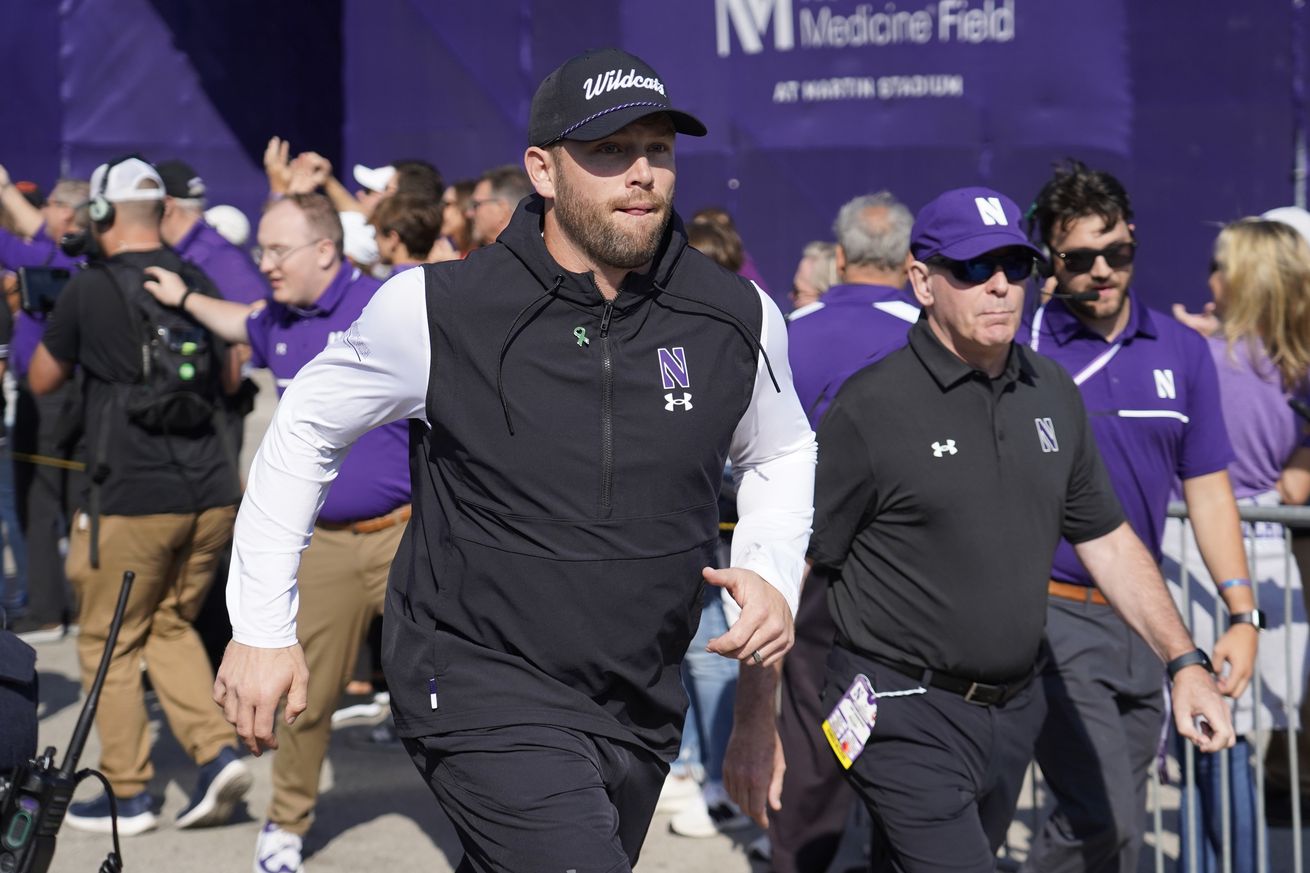
As Northwestern faces a tough final stretch, questions about David Braun’s coaching style loom.
There’s nothing quite as sweet as a victory in sports, especially when it feels like your season’s on life support, and the hope for a bowl game is gasping its last breath. But at what cost does a team claw for that win without leaving itself open to embarrassment? That’s the tightrope Northwestern, now 4-5 (2-4 B1G), walked on Saturday, pulling off a nail-biting 26-20 overtime win over a lowly Purdue squad limping through the season at 1-7 (0-5 B1G).
For Northwestern, this game wasn’t so much a triumph as it was a narrow escape. It felt less like a football contest and more like a never-ending Monopoly game where head coach David Braun had stockpiled every “Get Out of Jail Free” card in the deck.
Once again, Braun made choices that could make a pilot question his bearings—navigating a path so uncertain that the Wildcats were just a misstep away from veering off course. After being outmaneuvered in nearly every Big Ten matchup, he was fortunate that Purdue’s head coach, Ryan Walters, wasn’t exactly orchestrating a coaching clinic either. It was as if Purdue handed over the victory like a bank teller sliding cash to a polite robber—no resistance offered.
After signal-caller Jack Lausch started the day on a high note in Northwestern’s first offensive series—going 4-for-6 for 51 yards through the air and adding 9 more on the ground—Braun decided to try his luck with a two-quarterback trick, sending in Ryan Hilinski. Yes, the same quarterback who hadn’t seen a start since 2022 and went 1-5 in his brief stint as the ‘Cats’ signal-caller.
Hilinski briefly sparked hope, starting Northwestern’s third possession with a 16-yard pass to wideout Frank Covey IV. But just when it seemed this gamble might pay off, the South Carolina transfer reappeared with an arm as wild as a caged lion, sailing a pass meant for wideout A.J. Henning right into the waiting hands of Purdue’s Antonio Stevens.
It was the kind of decision that makes you wonder what Braun was seeing out there on the practice field—maybe a faint glimmer of the player Hilinski once was, or perhaps he was just feeling lucky. But whatever magic he thought he’d conjure, the result was as clear as day: a turnover, gift-wrapped for the Boilermakers and another head-scratching choice by Braun. It was the kind of misstep that could have been prevented with just a dash of caution, yet here it was, landing Northwestern right back on shaky ground.
Braun also delivered another masterclass on coaching malpractice in the second half. The Wildcats had a legitimate shot to win in regulation—they took possession on their own 25-yard line with 52 seconds left. But any hope of a last-minute drive was thwarted, thanks to Braun’s earlier blunder of burning all three timeouts like kindling for a campfire. And for what? To avoid a delay of game call ten minutes earlier. Spot a pattern here? This isn’t about a handful of isolated plays; this is a recurring theme—a tapestry of miscues by Braun, stitched together all season long.
However, Braun might as well have bought a winning lottery ticket at the gas station, as Purdue practically handed the game over to Northwestern. After receiving the ball first in overtime, Walters made the baffling decision to go for it on 4th-and-5 instead of taking the easy three points. The gamble backfired, setting the stage for Northwestern’s walk-off moment—a 22-yard touchdown pass from Lausch to tailback Joe Himon, sealing the victory despite Braun’s miscues throughout the contest.
Yes, Braun’s only in his second year and was thrust into a role he didn’t sign up for, arriving from North Dakota State to be the defensive coordinator before taking over for Pat Fitzgerald after the longtime coach was dismissed in the wake of a hazing scandal. But there are mistakes you learn from, and then there are mistakes you make a habit of, hoping for luck to bail you out or praying the other coach is just having a worse day. Right now, it’s unclear if Braun is doing either—or simply getting a weekly tutorial in humility from the opposite sideline.
While there are undeniable qualities to Braun’s leadership, his knack for developing talent—especially along the defensive line—stands out. Take Aidan Hubbard, who’s blossomed under Braun’s watch, rising to become one of the premier defensive players in the Big Ten. Additionally, Braun’s defensive schemes shine like a diamond in an otherwise rocky landscape, and he’s clearly got a firm grip on the locker room. After last season’s turbulence, with Fitzgerald’s sudden departure, Braun steadied the ship and rallied his players to an improbable 8-5 finish, defying every odd in the book.
Now, as Braun heads into the team’s final stretch—a brutal three-game gauntlet featuring Michigan, No. 2 Ohio State and bitter rival Illinois—he’ll need to show that his mistakes are the growing pains of a second-year head coach, not signs of a deeper flaw. This isn’t just any season finale; it’s a high-wire act over a raging fire. Braun’s decisions have drifted into the deep end, and if he doesn’t find his balance quickly, the Wildcats risk going under before they even have a chance to see the shore. It’s time for Braun to prove if he’s got the makings of a true leader or if he’s just treading water, hoping for a lifeline.
